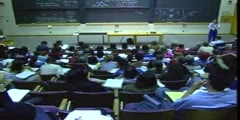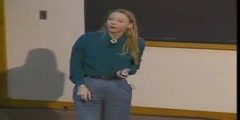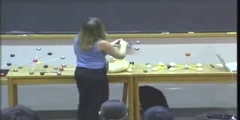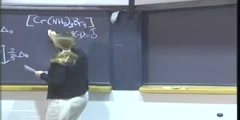Lec 10 - Marx's Theory of Historical Materialism (1)
"Lec 10 - Marx's Theory of Historical Materialism (1)" Foundations of Modern Social Thought (SOCY 151) We review Marx's theory of alienation and pick up with the transition from the young Marx to the mature Marx who breaks with Hegelian thought and the Young Hegelians. Reflecting on the disappointed hopes of the French Revolution, Hegel wrote that the civil servants in France represent the universal class. In direct contrast, Marx writes that the state only appears to be the universal class. He then goes about writing his theory of exploitation to argue that the workers, as the only fully alienated class, represent the universal position. He responds to Feuerbach with his eleven theses arguing for his own brand of historical materialism. Many of his "Theses on Feuerbach" remain very famous and widely-associated with Marx's oeuvre, including the last thesis, thesis eleven: the point of philosophy is not only to understand the world, but to change it. 00:00 - Chapter 1. The Importance of Marx's Theory of Alienation 15:06 - Chapter 2. Intellectual Developments towards the Theory of Alienation 27:27 - Chapter 3. "On the Jewish Question": Universal Emancipation 30:21 - Chapter 4. Introduction to "Critique of Hegel's Philosophy of Right" 37:51 - Chapter 5. Historical Materialism Complete course materials are available at the Open Yale Courses website: http://open.yale.edu/courses This course was recorded in Fall 2009.
Video is embedded from external source so embedding is not available.
Video is embedded from external source so download is not available.
Channels: Sociology
Tags: Lec 10 - Marx's Theory of Historical Materialism (1)
Uploaded by: yalemodsocialth ( Send Message ) on 14-09-2012.
Duration: 50m 24s
Here is the next lecture for this course
Lec 11 - Marx's Theory of Historical Mate ...
48:53 | 3322 viewsLec 12 - Marx's Theory of History
51:30 | 3291 viewsLec 9 - Marx's Theory of Alienation
48:04 | 2858 viewsLec 13 - Marx's Theory of Class and Explo ...
51:13 | 3140 viewsLec 17 - The Frankfurt School of Critical ...
51:37 | 3008 viewsLec 1 - Introduction - Introduction to Th ...
39:29 | 3451 viewsLec 17 - Conceptual Foundations of Weber' ...
52:46 | 2696 viewsLec 21 - Weber's Theory of Class
44:38 | 2787 viewsLec 23 - Durkheim's Theory of Anomie
46:42 | 3145 viewsLec 25 - The End of Theory?; Neo-Pragmatism
53:33 | 2400 viewsChemical Science - Molecular Orbital Theo ...
50:51 | 32435 viewsThe valence bond theory
49:54 | 23849 viewsChemical Science - The Shapes of Molecule ...
43:18 | 31889 viewsChemical Science - Transition Metals: Cry ...
40:23 | 13513 viewsAn unified theory of everything
02:11 | 8032 viewsNo content is added to this lecture.
This video is a part of a lecture series from of Yale
Lecture list for this course
Lec 2 -Hobbes: Authority, Human Rights and Social Order
Lec 3 -Locke: Equality, Freedom, Property and the Right to Dissent
Lec 4 -The Division of Powers- Montesquieu
Lec 5 - Rousseau: Popular Sovereignty and General Will
Lec 6 - Rousseau on State of Nature and Education
Lec 7 - Utilitarianism and Liberty, John Stuart Mill
Lec 8 - Smith: The Invisible Hand
Lec 9 - Marx's Theory of Alienation
Lec 11 - Marx's Theory of Historical Materialism (cont.)
Lec 12 - Marx's Theory of History
Lec 13 - Marx's Theory of Class and Exploitation
Lec 14 - Nietzsche on Power, Knowledge and Morality
Lec 15 - Freud on Sexuality and Civilization
Lec 16 - Weber on Protestantism and Capitalism
Lec 17 - Conceptual Foundations of Weber's Theory of Domination
Lec 18 - Weber on Traditional Authority
Lec 19 - Weber on Charismatic Authority
Lec 20 - Weber on Legal-Rational Authority
Lec 21 - Weber's Theory of Class
Lec 22 - Durkheim and Types of Social Solidarity















